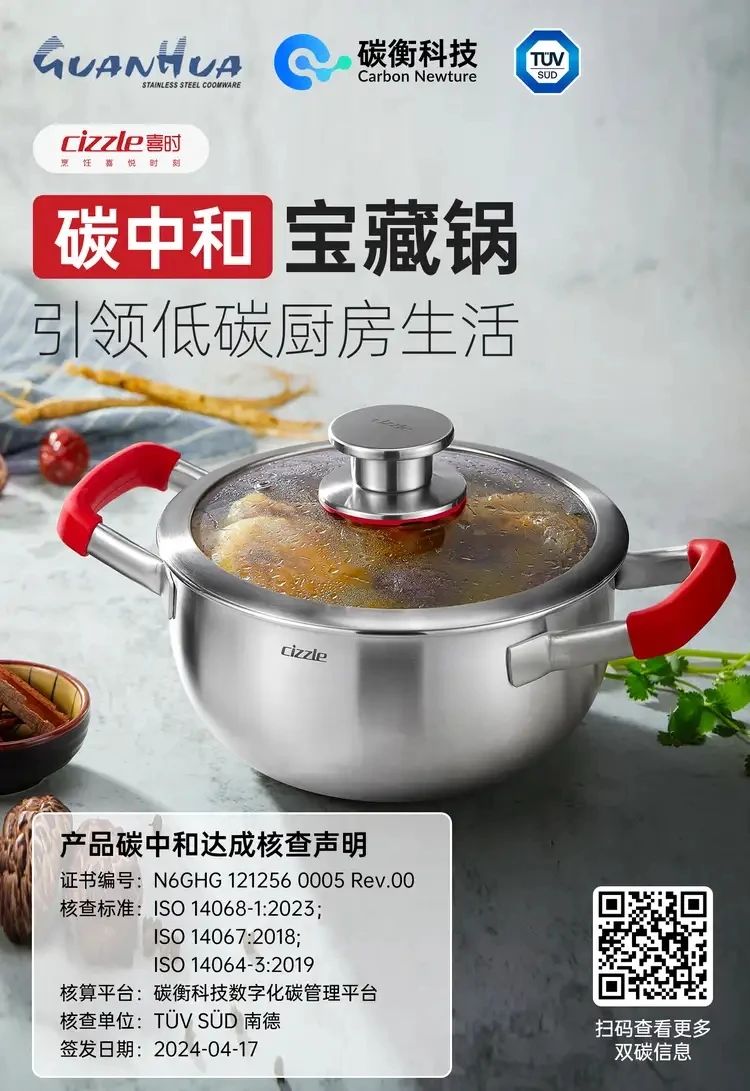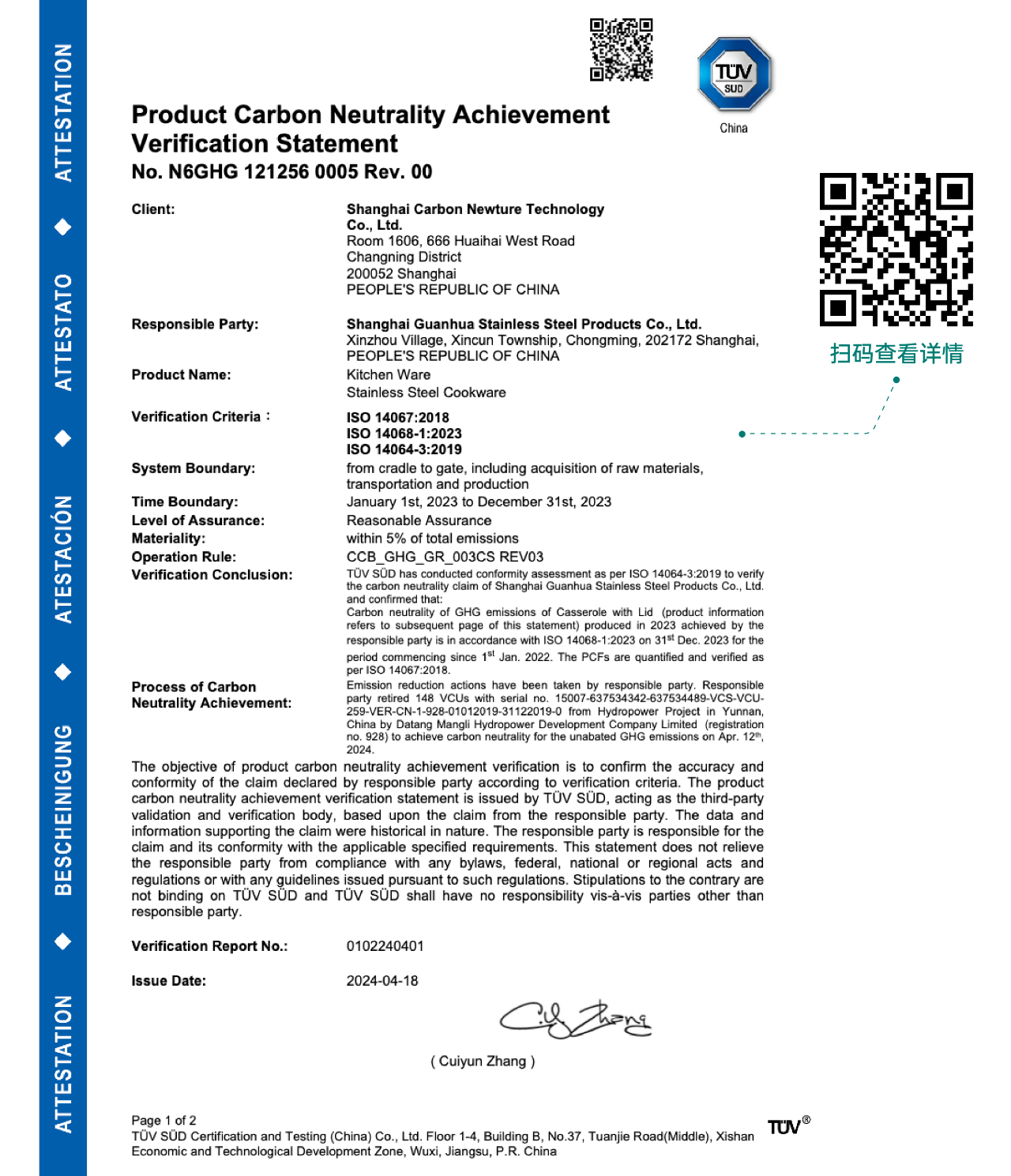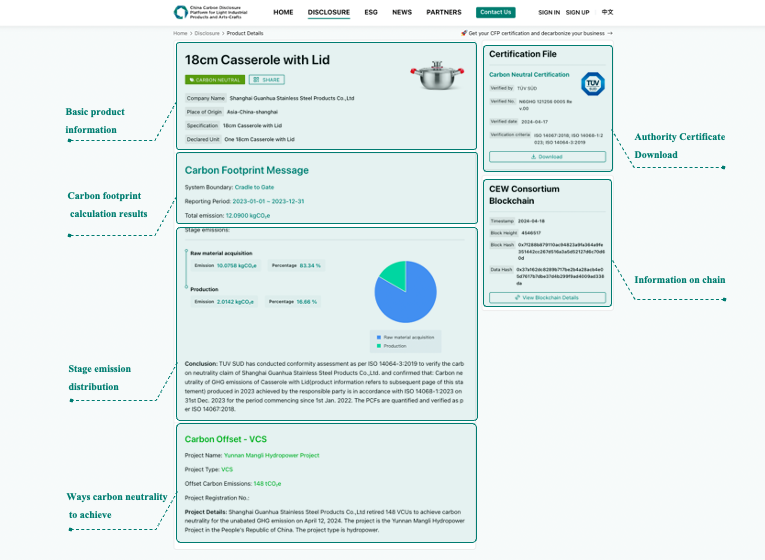Recently, three treasure pots from the kitchenware brand Cizzle, under Stainless Steel Products Shanghai Guanhua Co., Ltd.(hereinafter referred to as Shanghai Guanhua), have been awarded the kitchenware industry's first carbon neutrality certification based on ISO 14068-1.

The carbon neutrality certification, awarded by the internationally recognized third-party certification body TÜV SÜD, signifies that the three products have achieved carbon neutrality in the stages of raw material acquisition and production manufacturing throughout their lifecycle. This not only provides consumers with low-carbon, eco-friendly kitchenware options but also encourages more kitchenware brands to join in emission reduction efforts.

Carbon neutrality certification certificate
01.Carbon neutral kitchenware leading the way to low-carbon kitchen living
Let's delve into how Cizzle treasure pots achieved carbon neutrality step by step. Through a digital carbon management platform from Carbon Newture, Shanghai Guanhua rigorously accounted for and analyzed all emission sources from "cradle to gate". Understanding that the production of the three-layer steel materials and the electricity consumption during the production process were the main sources of carbon footprint for the product, they implemented a series of carbon reduction measures to lower carbon emissions throughout the product lifecycle.
Firstly, Shanghai Guanhua optimized production processes to reduce carbon emissions in the primary raw material production stage. Simultaneously, they accelerated the green transformation of energy by increasing the proportion of photovoltaic power generation in their energy structure, with plans to incorporate wind power into their energy structure in the future. Additionally, Shanghai Guanhua implemented carbon offset measures for the remaining carbon emissions. Through these efforts, the three products successfully achieved carbon neutrality based on the ISO 14068-1 standard.
ISO 14068-1 is an international standard for carbon neutrality published by the International Organization for Standardization (ISO) on November 30, 2023, expected to fully replace the widely recognized PAS 2060 standard by the end of 2025.
02.Shanghai Guanhua
Shanghai Guanhua was established in September 2000, with its factory located in Chongming District, Shanghai. It is a large-scale production enterprise integrating research and development, production, and sales of high-end stainless steel kitchenware. Its main products include various types of mid-to-high-end stainless steel cookware, and it owns the high-end kitchenware brand "Cizzle".
In response to the dual carbon policy and recognition of the concept of sustainable development, Shanghai Guanhua has long been committed to implementing sustainable practices in its business operations. Not only has Shanghai Guanhua conducted carbon footprint accounting and carbon neutrality certification for three different models of Cizzle products, but it also plans to gradually achieve carbon neutrality for products across the entire factory and is dedicated to optimizing the company's energy structure by increasing the proportion of clean energy.
Recognizing that the main source of product carbon footprint lies in the upstream supply chain, Shanghai Guanhua is helping to reduce the carbon footprint of the entire supply chain by seeking alternative raw materials and encouraging suppliers to conduct greenhouse gas accounting. In the future, it aims to encourage 70% of its suppliers (covering all goods and services) to conduct greenhouse gas accounting and set emission reduction targets. Additionally, with the assistance of Carbon Balanced Technology, Shanghai Guanhua has developed short-term and long-term carbon neutrality management plans (with the base year being 2022). Through active practices in low-carbon sustainable development, Shanghai Guanhua has not only spurred attention to low-carbon products in the kitchenware industry but also provided a reference for other kitchenware enterprises regarding supply chain carbon reduction and carbon neutrality paths.
03.Why kitchenware needs to achieve carbon neutrality
The necessity for the kitchenware industry to strive for carbon neutrality arises from the impetus of dual carbon policies both domestically and internationally, placing kitchenware enterprises on the brink or in anticipation of a "green threshold". For instance, some countries require imported goods to meet specific low-carbon standards; otherwise, they may face additional taxes or restrictions. Simultaneously, the creation of carbon-neutral products provides brands with a differentiated competitive advantage in global competition.
Furthermore, akin to the saying "every little helps", while individual enterprises' carbon reduction actions may seem small, their demonstration effect and influence quietly propel sustainable development upstream and downstream in the supply chain, sparking consumer demand for low-carbon products.
04.Carbon Newture helps Shanghai Guanhua achieve product carbon neutrality certification
For kitchenware enterprises, conducting carbon footprint calculation and carbon neutrality certification is a challenging task. Due to a lack of expertise and digital technology, companies may struggle to grasp the correct methods for collecting and calculating carbon data and may be unsure how to effectively reduce carbon emissions. Additionally, products often involve complex supply chains and production processes, making carbon footprint accounting even more intricate. Moreover, increased compliance risks and cost pressures can also pose obstacles for companies on the path to achieving carbon neutrality.
In just over twenty days, Shanghai Guanhua, with the assistance of Carbon Newture's digital carbon management platform and professional services, gained a clear understanding of the carbon footprint of three Cizzle products throughout their lifecycle, from "cradle to gate." They then offset emissions by purchasing green energy and carbon credits, ultimately obtaining carbon neutrality certification from TÜV SÜD. This ensured the compliance and authority of their carbon data.

The distribution of carbon footprints of cizzle treasure pots